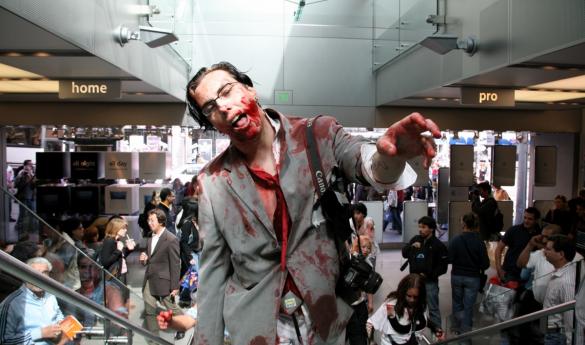Mason professor sets the record straight about the origins of zombies
This week, zombies have taken over campus as part of Mason’s first ever Geek Week. On October 10, students and staff gathered in the Johnson Center to listen to a lecture on zombies given by anthropology professor Jeffery Mantz, who specializes in zombie culture.
Alongside Geek Week’s other zombie event, Humans vs. Zombies which will start at 6 p.m. at the JC North Plaza on Oct. 12, the lecture tapped into the students’ love of zombies and of the horror genre. Rather than focus on the zombies seen in modern day media, the lecture concentrated on the origin of zombies and the cross-cultural nature of their existence.
While American audiences are accustomed to lurching, brain-hungry zombies, Mantz was quick to point out that zombies have existed prior to George A. Romero’s 1968 classic, Night of the Living Dead.
Mantz’s interest in zombies originally started while studying spirituality in the Caribbean. He emphasized the fact that zombies originate from Haiti and are living humans whose souls have been enslaved by voodoo priests. This spiritual aspect of zombies separate Caribbean zombies from the American zombies of today. As his work led him to discover, zombies have their roots in spirituality.
According to Mantz, other zombie-like creatures can be found around the world. In China, zombies are called jiangshi and rather than looking for brains, these zombies are searching for the souls of the living. In Western Europe, revenants are reanimated corpses that “return to torment the living.”
Zombies in the media today can be found in television, video games, literature, and even in commercials. As Mantz stated, “there is no end to their entertainment value.” While zombie portrayals range from comedic to horrific, there is no denying that their popularity has boomed with recent films, such as World War Z and television shows like The Walking Dead.
Zombies have also become more relevant than ever as they deal with “some sort of anxiety we have out there,” Mantz said. Whether it be pandemics, market crashes or even the apocalypse, zombies are able to express the fear and worry that exists in the today’s world.
Mantz also argued that our society is becoming full of zombies, largely due to the fact that technology has taken control of our lives.
“Technology takes the place of face-to-face contact,” Mantz said.
In a sense, we become zombies whenever we walk down the street looking at our phones rather than at the world around us.
With Halloween just weeks away, the lecture served as a tool for students to learn more about zombies and their origins. While our media views zombies as brain-hungry beings, it was insightful for Mason students to learn about zombies in different cultures around the world.

